

The Postmodern Era: The Postmodern Era: American culture and society in the post-World War II era: The era immediately following the war was incredibly positive and optimistic, at least on the surface.
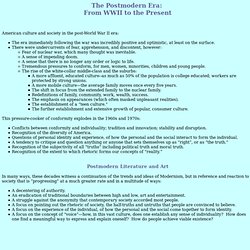
There were undercurrents of fear, apprehension, and discontent, however: Fear of nuclear war, which many thought was inevitable. A sense of impending doom. A sense that there is no longer any order or logic to life. This pressure-cooker of conformity explodes in the 1960s and 1970s: Conflicts between conformity and individuality; tradition and innovation; stability and disruption. In many ways, these decades witness a continuation of the trends and ideas of Modernism, but in reference and reaction to a society that is “progressing” at a much greater rate and in a multitude of ways: A decentering of authority. Modern Era (1946 - present) The development and growth of the United States during this era was influenced by helping Europe recover from World War II and U.S. involvement in other wars--mainly the Cold War with the Soviet Union and the Vietnam and Korean Wars.
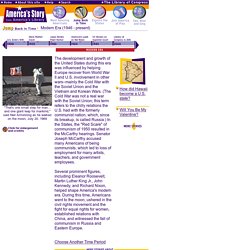
(The Cold War was not a real war with the Soviet Union; this term refers to the chilly relations the U.S. had with the formerly communist nation, which, since its breakup, is called Russia.) In the States, the "Red Scare" of communism of 1950 resulted in the McCarthy hearings. Senator Joseph McCarthy accused many Americans of being communists, which led to loss of employment for many artists, teachers, and government employees. Several prominent figures, including Eleanor Roosevelt, Martin Luther King Jr., John Kennedy, and Richard Nixon, helped shape America's modern era. The Victorian Period. The Victorian period formally begins in 1837 (the year Victoria became Queen) and ends in 1901 (the year of her death).
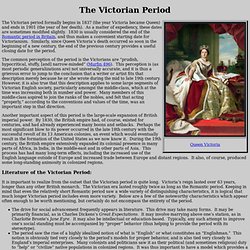
As a matter of expediency, these dates are sometimes modified slightly. 1830 is usually considered the end of the Romantic period in Britain, and thus makes a convenient starting date for Victorianism. Similarly, since Queen Victoria’s death occurred so soon in the beginning of a new century, the end of the previous century provides a useful closing date for the period. The common perception of the period is the Victorians are “prudish, hypocritical, stuffy, [and] narrow-minded” (Murfin 496).
This perception is (as most periodic generalizations are) not universally accurate, and it is thus a grievous error to jump to the conclusion that a writer or artist fits that description merely because he or she wrote during the mid to late 19th century. The Georgian Era (1714-1811) Overview The crowning of King George I ushered in the reign of the House of Brunswick in England.
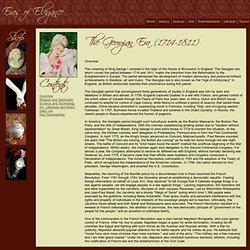
The Georgian era, which covers the period between 1714 and 1811, marks the transition from the Reformation to the Enlightenment in Europe. The period witnessed the development of modern democracy and produced brilliant achievements in literature, art and music. The Georgian era is also known as the "Age of Aristocracy" in England, as British aristocrats reached their prominence during this period. The Georgian period that encompassed three generations of royalty in England was torn by wars and rebellions in Britain and abroad. In America, the Georgian period brought such tumultuous events as the Boston Massacre, the Boston Tea Party, and the War of Independence.
Meanwhile, the storming of the Bastille prison by a discontented mob in Paris launched the French Revolution. One of the commanders in the French Revolution was a man named Napoleon Bonaparte, who soon gained control of France. The Renaissance Period. As of July 1, 2013 ThinkQuest has been discontinued.
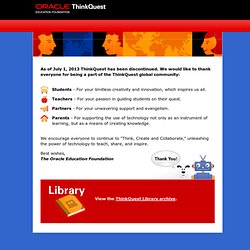
We would like to thank everyone for being a part of the ThinkQuest global community: Students - For your limitless creativity and innovation, which inspires us all. Teachers - For your passion in guiding students on their quest. Partners - For your unwavering support and evangelism. Parents - For supporting the use of technology not only as an instrument of learning, but as a means of creating knowledge. We encourage everyone to continue to “Think, Create and Collaborate,” unleashing the power of technology to teach, share, and inspire. Middle Ages.